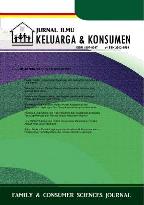KERENTANAN, STRATEGI KOPING, DAN PENYESUAIAN ANAK DI LEMBAGA PEMBINAAN KHUSUS ANAK (LPKA)
Keywords:
adjustment, child prisoner, coping strategies, internal support, vulnerability
Abstract
Social isolation and stress could be affected child adjustment in prison. This study aimed to analyze the influence of prison duration, family visits, vulnerability, and coping strategies on an adjustment of children in child correction institution. This study conducted in child correction institution at Tangerang City, Banten Province and used cross-sectional study design. This research involved 95 boys prisoners who had a length of prison was less than one year. Data were analyzed by multiple linear regression. The results showed that the more stress and control in prison, the more difficult for child prisoner to adjust in prison. The research also revealed that more than half of child prisoner had the vulnerability in low categories. Beside that, more than half of child prisoner also had coping strategies in high category and had coping strategies that were focused on emotions. The highest mean scores of child prisoner’s adjustment were restraint dimension. Adjustment of child prisoner was influenced by internal support, prison control, and coping strategies. This study asserted that at an early period of detention, child prisoner needs to make some coping strategies so they could adapt to the prison environment. Even though, in general, the coping strategies are increasing as well as the increasing of adjustment ability.
Published
2018-01-29
How to Cite
SopiahN. N., KrisnatutiD., & SimanjuntakM. (2018). KERENTANAN, STRATEGI KOPING, DAN PENYESUAIAN ANAK DI LEMBAGA PEMBINAAN KHUSUS ANAK (LPKA). Jurnal Ilmu Keluarga Dan Konsumen, 10(3), 192-203. https://doi.org/10.24156/jikk.2017.10.3.192
Section
Articles
Copyright (c) 2018 Jurnal Ilmu Keluarga & Konsumen

This work is licensed under a Creative Commons Attribution-ShareAlike 4.0 International License.
Authors submitting manuscripts should understand and agree that copyright of manuscripts published are held Jurnal Ilmu Keluarga & Konsumen. The statement to release the copyright to Jurnal Ilmu Keluarga dan Konsumen is stated in Copyright Release Form. Copyright encompass exclusive rights to reproduce, to distribute, and to sell any part of the journal articles in all form and media. The reproduction of any part of this journal is allowed with a written permission from Jurnal Ilmu Keluarga dan Konsumen.









